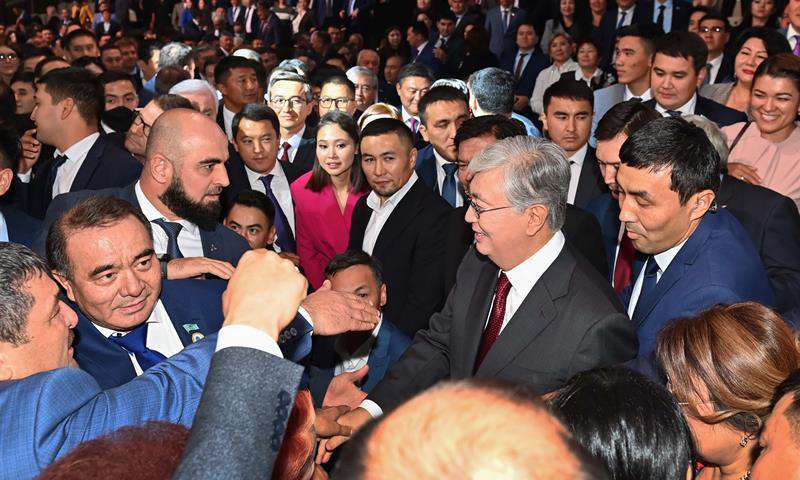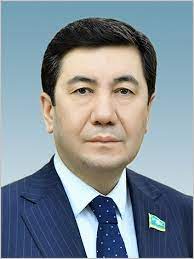ASTANA – President Kassym-Jomart Tokayev is holding to his commitment to improving the lives of the Kazakh people. His priorities since assuming the presidency a year ago include fighting monopolization of power and implementing the Just Kazakhstan initiative, said Yerlan Koshanov, the chairman of the Mazhilis, the lower house of the Parliament, in an interview with Kazakhstanskaya Pravda newspaper on Nov. 24.

One year since assuming the presidency, Tokayev shows strong commitment to implement promised reforms. Photo credit: Kazakhstanskaya pravda newspaper
Internal prerequisites for reforms
Several factors prompted President Tokayev to unveil a series of reforms. One of the biggest impediments facing economic development was the monopolization of power – a matter that Tokayev acknowledged.
“The president saw that some imbalances had accumulated in the country. First, a long-standing monopoly in politics led to economic stagnation. There was a lack of competition. Lack of reforms led to monopolization of markets, violation of property rights, and so on,” said Koshanov.

Yerlan Koshanov. Photo credit: parlam.kz
The political aspect was not the sole reason reforms were implemented.
“Society has changed a lot. Its structure, thinking, and needs have become completely different. A new generation with different values and attitudes has emerged. Today, over 60% of the country’s residents belong to the independence generation (…) These people want not only to be heard but also to be involved in the governance of the state,” he said.
Tokayev’s foreign policy
According to Koshanov, Tokayev has successfully established fruitful diplomatic relations with the world, positioning Kazakhstan as a pivotal link between Asia and Europe.
“Over the past year, he has held productive discussions with all key world leaders, participated in key summits, and spoken at the most authoritative international forums,” said Koshanov.
“The head of state has heightened global interest in Kazakhstan as a country that can become a connector country in the new geopolitical reality, a neutral jurisdiction with a predictable investment climate, through which trade is carried out, investments are attracted, and vital resources pass,” he added.
He highlighted Tokayev’s recent visit to China, which resulted in the signing of agreements worth $16.5 billion, while his participation at the Interregional Cooperation Forum held in November attracted contracts valued at $100 million.
“This is all aimed at strengthening our sovereignty – economic and political, and ultimately, it has a direct impact on enhancing the well-being of every Kazakh. Pragmatism and observance of national interests is the main priority of the President’s policy,” Koshanov added.
How is the concept of Just Kazakhstan implemented?
Tokayev’s policies are not limited to the foreign policy dimension. Implementation of ‘Just Kazakhstan’ for every citizen of the country is among the President’s primary concerns in domestic affairs, said Koshanov.
“Just Kazakhstan is not a mythical goal. The President presented a very clear, visionary picture of the future when he spoke about it,” he said.
Koshanov described Just Kazakhstan as a “country where citizens have equal access to quality infrastructure, especially social infrastructure, regardless of their place of residence and origin. A country where order and the rule of law reign for everyone without exception. Where equality of starting opportunities is ensured, regardless of whether a person is poor or rich, where basic conditions for the development and self-realization of all citizens are created.”
Koshanov provided examples of how this policy is being implemented.
“We are now funding the construction of schools using the assets recovered from corrupt officials. This best accomplishes the President’s idea on the restoration of social justice. After all, those who stole from the budget stole from our children and future generations. To date, 150 billion tenge ($325 million)) has already been received for these purposes and 70 schools are being built in all regions of the country,” said Koshanov.
No more monopolization of power
Koshanov highlighted the strength and efficacy of Tokayev’s government, beginning with the President himself.
“The President started with himself. He limited his own powers and opportunities. Now a citizen of Kazakhstan can be the head of state only once and for seven years. He cannot appoint his close relatives to important state positions or quasi-state companies. Additionally, he no longer has the authority to cancel the acts of akims (local mayors), especially since they are elected by the people. Thus, the President has signaled to both society and the elite that there will be no more monopolization of power,” said Koshanov.
The reboot of the Mazhilis also established a more balanced government with fairer and more representative decision-making capacity.
“Now we have the most representative composition of the Parliament in the modern history of the country, including six parties and single-mandate candidates. It observes quotas for young people and women, and includes an inclusive group of deputies (MPs) focused on the issues of people with special needs,” said Koshanov.
According to Koshanov, the Mazhilis is now “the most open state structure and the main public tribune of the country.”
“The government has genuinely become an accountable representative of the people. The deputies bring forward the most acute and pressing societal concerns to the ministers. I can state that no serious topic is left undiscussed within the Parliament,” he added.
